(convert properties for internationnalized Wikifab) |
(Cette version a été marquée pour être traduite) |
||
| Ligne 5 : | Ligne 5 : | ||
|Type=Creation | |Type=Creation | ||
|Area=Robotics, Electronics, Play & Outside | |Area=Robotics, Electronics, Play & Outside | ||
| − | |Description=<translate>Tito is a Biped dancing DIY robot, derivative from Zowi and Bob, basically has been adapted to an standard Arduino UNO board with easier connections and supports.</translate> | + | |Description=<translate><!--T:1--> Tito is a Biped dancing DIY robot, derivative from Zowi and Bob, basically has been adapted to an standard Arduino UNO board with easier connections and supports.</translate> |
|Difficulty=Medium | |Difficulty=Medium | ||
|Cost=45 | |Cost=45 | ||
| Ligne 15 : | Ligne 15 : | ||
}} | }} | ||
{{ {{tntn|Introduction}} | {{ {{tntn|Introduction}} | ||
| − | |Introduction=<translate>Tito is a Biped dancing DIY robot, derivative from Zowi and Bob, basically has been adapted to an standard arduino UNO board. original project Zowi https://github.com/bqlabs/zowi</translate> | + | |Introduction=<translate><!--T:2--> Tito is a Biped dancing DIY robot, derivative from Zowi and Bob, basically has been adapted to an standard arduino UNO board. original project Zowi https://github.com/bqlabs/zowi</translate> |
}} | }} | ||
{{ {{tntn|Materials}} | {{ {{tntn|Materials}} | ||
| − | |Material=<translate>Arduino UNO | + | |Material=<translate><!--T:3--> |
| + | Arduino UNO | ||
Nano breadboard or | Nano breadboard or | ||
Buzzer | Buzzer | ||
| Ligne 43 : | Ligne 44 : | ||
{{Separator}} | {{Separator}} | ||
{{ {{tntn|Tuto Step}} | {{ {{tntn|Tuto Step}} | ||
| − | |Step_Title=<translate>3D print parts</translate> | + | |Step_Title=<translate><!--T:4--> 3D print parts</translate> |
| − | |Step_Content=<translate>3D .stl files here: http://www.thingiverse.com/thing:1378605 | + | |Step_Content=<translate><!--T:5--> |
| + | 3D .stl files here: http://www.thingiverse.com/thing:1378605 | ||
Find a way to 3d print the parts, they are designed for no supports so is very easy to print with 20% infill and 0.2mm resolution.</translate> | Find a way to 3d print the parts, they are designed for no supports so is very easy to print with 20% infill and 0.2mm resolution.</translate> | ||
|Step_Picture_00=3dprinter.JPG | |Step_Picture_00=3dprinter.JPG | ||
| Ligne 54 : | Ligne 56 : | ||
}} | }} | ||
{{ {{tntn|Tuto Step}} | {{ {{tntn|Tuto Step}} | ||
| − | |Step_Title=<translate>Pre assemble</translate> | + | |Step_Title=<translate><!--T:6--> Pre assemble</translate> |
| − | |Step_Content=<translate>There is many was to build Tito, but one recommendation is before the connect the servos is to assemble the servo disk pieces to the legs, then put the servos in the body and the feet..</translate> | + | |Step_Content=<translate><!--T:7--> There is many was to build Tito, but one recommendation is before the connect the servos is to assemble the servo disk pieces to the legs, then put the servos in the body and the feet..</translate> |
|Step_Picture_00=Tito (3).jpg | |Step_Picture_00=Tito (3).jpg | ||
|Step_Picture_01=Tito parts.jpg | |Step_Picture_01=Tito parts.jpg | ||
| Ligne 64 : | Ligne 66 : | ||
}} | }} | ||
{{ {{tntn|Tuto Step}} | {{ {{tntn|Tuto Step}} | ||
| − | |Step_Title=<translate>The Schematic</translate> | + | |Step_Title=<translate><!--T:8--> The Schematic</translate> |
| − | |Step_Content=<translate>Follow the picture for the connections. | + | |Step_Content=<translate><!--T:9--> |
| + | Follow the picture for the connections. | ||
HC-SR04 Ultrasound sensor (not connected in the schematic; trig for pin 8 and echo for pin 9). | HC-SR04 Ultrasound sensor (not connected in the schematic; trig for pin 8 and echo for pin 9). | ||
During the making process you may need to disconnect and connect constantly so just keep this schematic present for further fixes.</translate> | During the making process you may need to disconnect and connect constantly so just keep this schematic present for further fixes.</translate> | ||
| Ligne 76 : | Ligne 79 : | ||
}} | }} | ||
{{ {{tntn|Tuto Step}} | {{ {{tntn|Tuto Step}} | ||
| − | |Step_Title=<translate>Test the position of the servos</translate> | + | |Step_Title=<translate><!--T:10--> Test the position of the servos</translate> |
| − | |Step_Content=<translate>In the picture the cables are disconnected but the idea here is to upload a code to the Arduino board (https://github.com/agomezgar/tutoriales/tree/master/tutorialZowi3/prepararServosparaMontaje) that will put the all servos in 90 degrees and then fix the right angle for the crank discs in the body and the feet. Tito should be in a neutral position like the photo. then you can fix all the servos with the screw axis.</translate> | + | |Step_Content=<translate><!--T:11--> In the picture the cables are disconnected but the idea here is to upload a code to the Arduino board (https://github.com/agomezgar/tutoriales/tree/master/tutorialZowi3/prepararServosparaMontaje) that will put the all servos in 90 degrees and then fix the right angle for the crank discs in the body and the feet. Tito should be in a neutral position like the photo. then you can fix all the servos with the screw axis.</translate> |
|Step_Picture_00=Tito align.jpg | |Step_Picture_00=Tito align.jpg | ||
|Step_Picture_01=No-image-yet.jpg | |Step_Picture_01=No-image-yet.jpg | ||
| Ligne 86 : | Ligne 89 : | ||
}} | }} | ||
{{ {{tntn|Tuto Step}} | {{ {{tntn|Tuto Step}} | ||
| − | |Step_Title=<translate>Assemble Arduino board</translate> | + | |Step_Title=<translate><!--T:12--> Assemble Arduino board</translate> |
| − | |Step_Content=<translate>This design make it easy to fix any Arduino Uno compatible board (in my case a DFRduino UNO) in the head part, you can use up to 4 screws.</translate> | + | |Step_Content=<translate><!--T:13--> This design make it easy to fix any Arduino Uno compatible board (in my case a DFRduino UNO) in the head part, you can use up to 4 screws.</translate> |
|Step_Picture_00=Tito (30).JPG | |Step_Picture_00=Tito (30).JPG | ||
|Step_Picture_01=No-image-yet.jpg | |Step_Picture_01=No-image-yet.jpg | ||
| Ligne 96 : | Ligne 99 : | ||
}} | }} | ||
{{ {{tntn|Tuto Step}} | {{ {{tntn|Tuto Step}} | ||
| − | |Step_Title=<translate>Final assembly</translate> | + | |Step_Title=<translate><!--T:14--> Final assembly</translate> |
| − | |Step_Content=<translate>If all connections are secured you can close the head part and fix it to the body using the lateral screws.</translate> | + | |Step_Content=<translate><!--T:15--> If all connections are secured you can close the head part and fix it to the body using the lateral screws.</translate> |
|Step_Picture_00=Tito (15).jpg | |Step_Picture_00=Tito (15).jpg | ||
|Step_Picture_01=No-image-yet.jpg | |Step_Picture_01=No-image-yet.jpg | ||
| Ligne 106 : | Ligne 109 : | ||
}} | }} | ||
{{ {{tntn|Tuto Step}} | {{ {{tntn|Tuto Step}} | ||
| − | |Step_Title=<translate>Programming</translate> | + | |Step_Title=<translate><!--T:16--> Programming</translate> |
| − | |Step_Content=<translate>All libraries and Arduino source code are in this Github repository: https://github.com/bqlabs/zowi | + | |Step_Content=<translate><!--T:17--> |
| + | All libraries and Arduino source code are in this Github repository: https://github.com/bqlabs/zowi | ||
Just connect your USB cable to Arduino and upload the codes | Just connect your USB cable to Arduino and upload the codes | ||
There are many programmed movements for the robot like walk different directions, raise, tilt and dance.</translate> | There are many programmed movements for the robot like walk different directions, raise, tilt and dance.</translate> | ||
| Ligne 118 : | Ligne 122 : | ||
}} | }} | ||
{{ {{tntn|Notes}} | {{ {{tntn|Notes}} | ||
| − | |Notes=<translate>3D print files: http://www.thingiverse.com/thing:137860 | + | |Notes=<translate><!--T:18--> |
| + | 3D print files: http://www.thingiverse.com/thing:137860 | ||
Code: https://github.com/bqlabs/zowi | Code: https://github.com/bqlabs/zowi | ||
}} | }} | ||
Version du 11 août 2017 à 13:23
Introduction
Étape 1 - 3D print parts
3D .stl files here: http://www.thingiverse.com/thing:1378605 Find a way to 3d print the parts, they are designed for no supports so is very easy to print with 20% infill and 0.2mm resolution.
Étape 2 - Pre assemble
There is many was to build Tito, but one recommendation is before the connect the servos is to assemble the servo disk pieces to the legs, then put the servos in the body and the feet..
Étape 3 - The Schematic
Follow the picture for the connections. HC-SR04 Ultrasound sensor (not connected in the schematic; trig for pin 8 and echo for pin 9). During the making process you may need to disconnect and connect constantly so just keep this schematic present for further fixes.
Étape 4 - Test the position of the servos
In the picture the cables are disconnected but the idea here is to upload a code to the Arduino board (https://github.com/agomezgar/tutoriales/tree/master/tutorialZowi3/prepararServosparaMontaje) that will put the all servos in 90 degrees and then fix the right angle for the crank discs in the body and the feet. Tito should be in a neutral position like the photo. then you can fix all the servos with the screw axis.
Étape 5 - Assemble Arduino board
This design make it easy to fix any Arduino Uno compatible board (in my case a DFRduino UNO) in the head part, you can use up to 4 screws.
Étape 6 - Final assembly
If all connections are secured you can close the head part and fix it to the body using the lateral screws.
Étape 7 - Programming
All libraries and Arduino source code are in this Github repository: https://github.com/bqlabs/zowi Just connect your USB cable to Arduino and upload the codes There are many programmed movements for the robot like walk different directions, raise, tilt and dance.
Notes et références
3D print files: http://www.thingiverse.com/thing:137860 Code: https://github.com/bqlabs/zowi
Yes
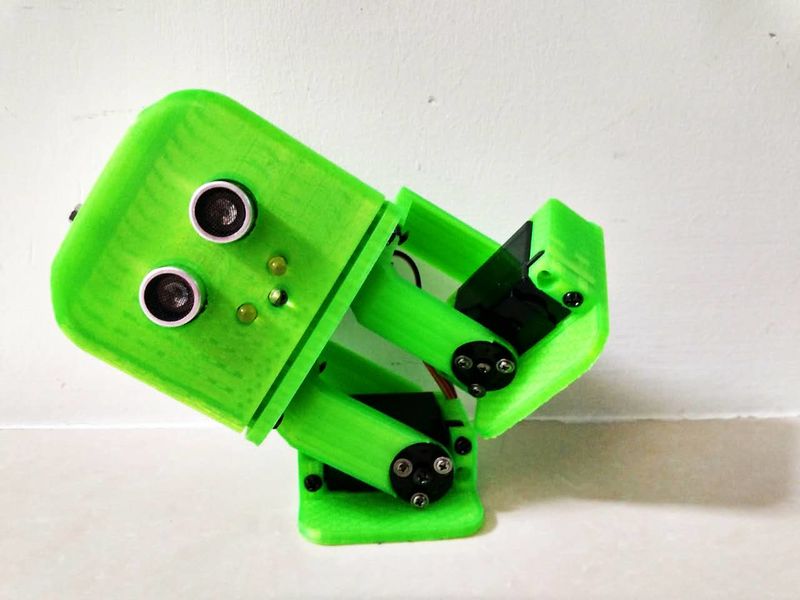
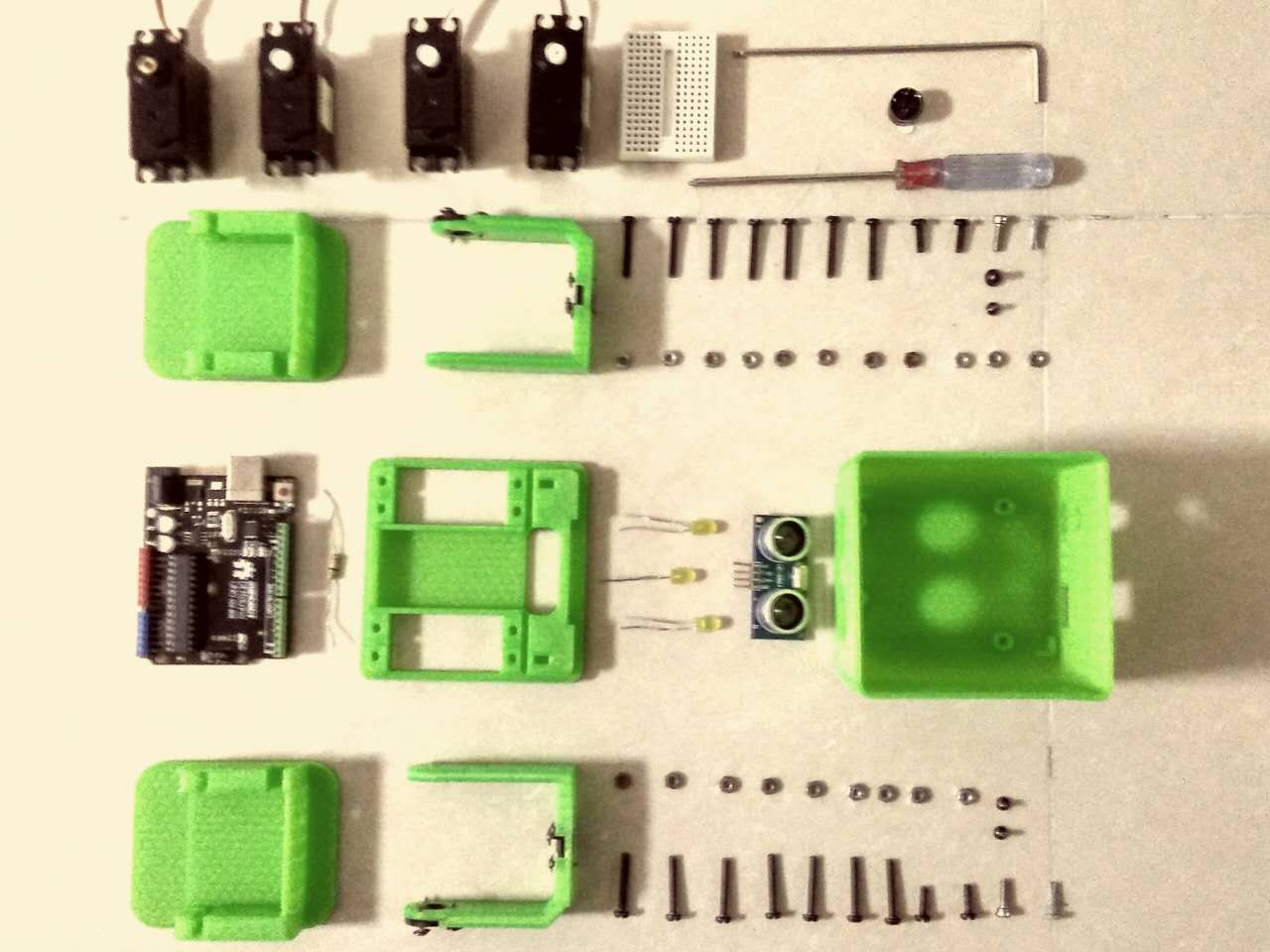
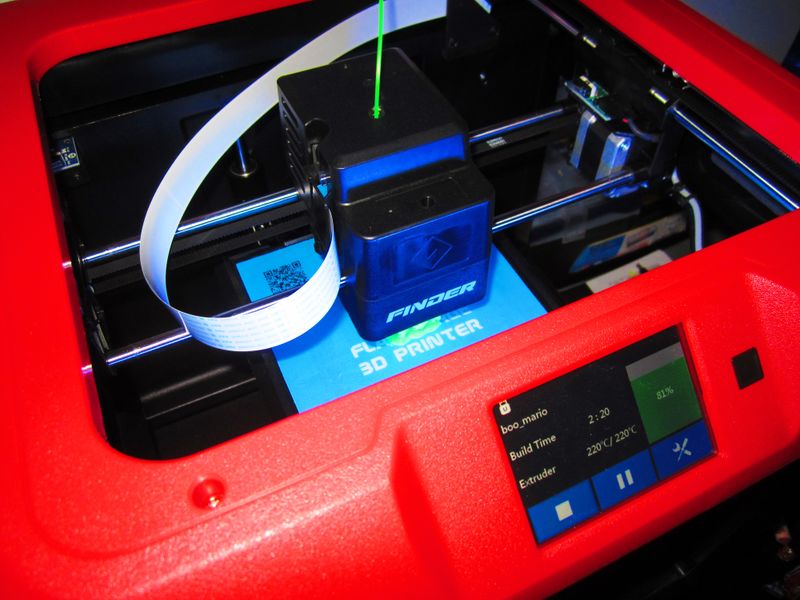

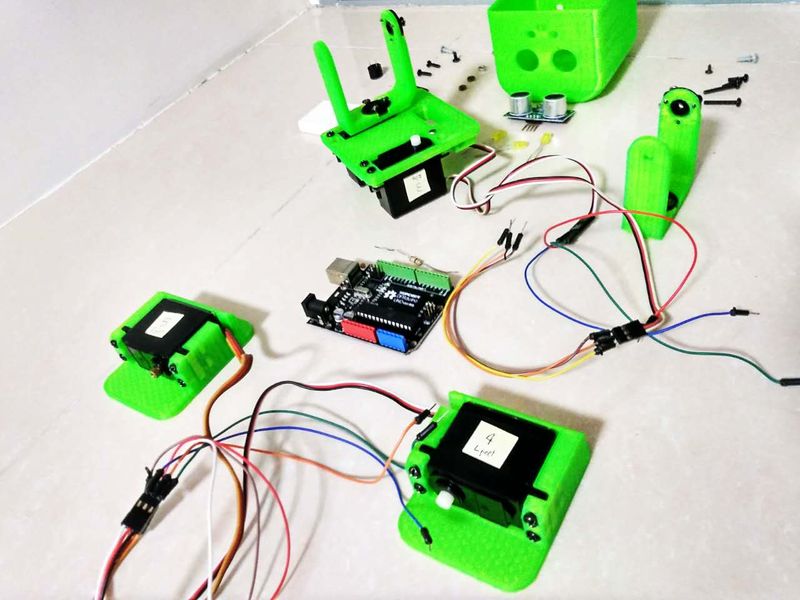
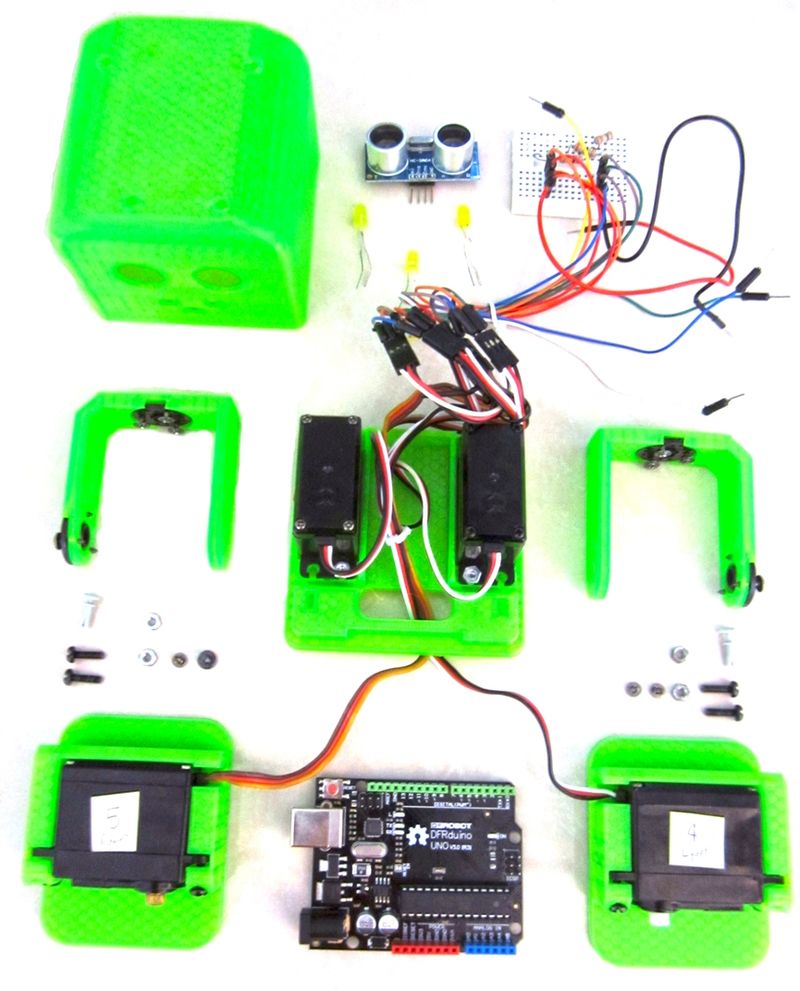
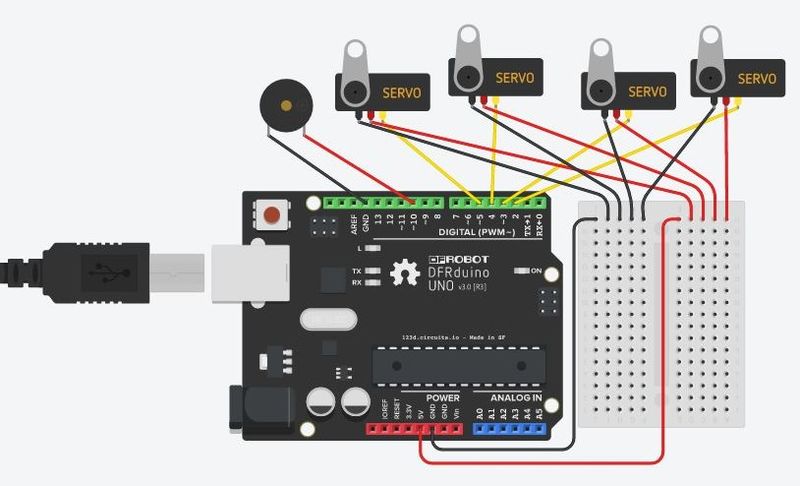
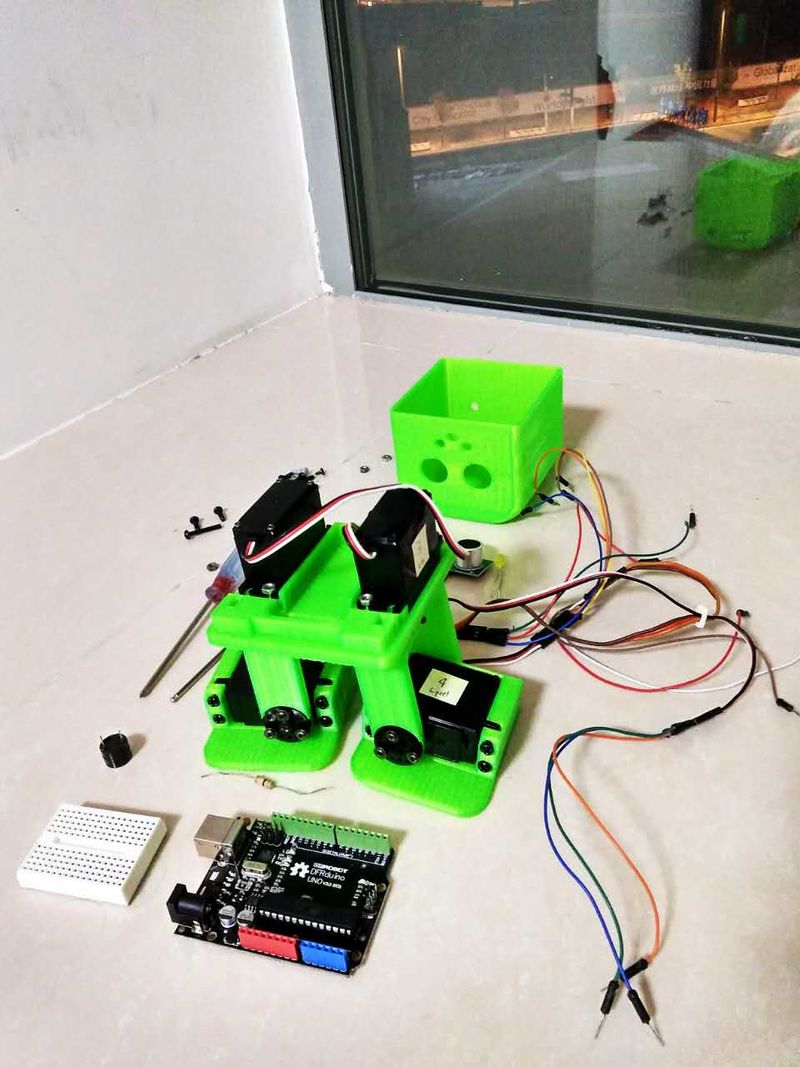
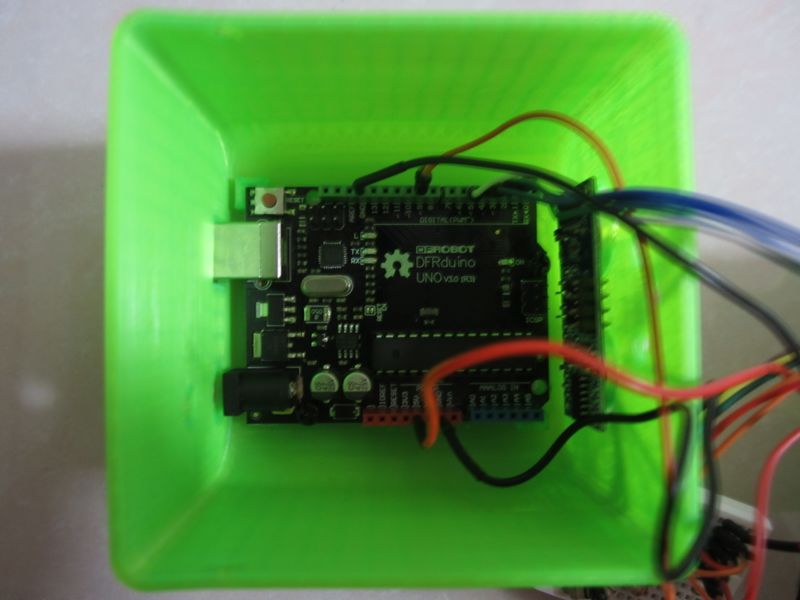
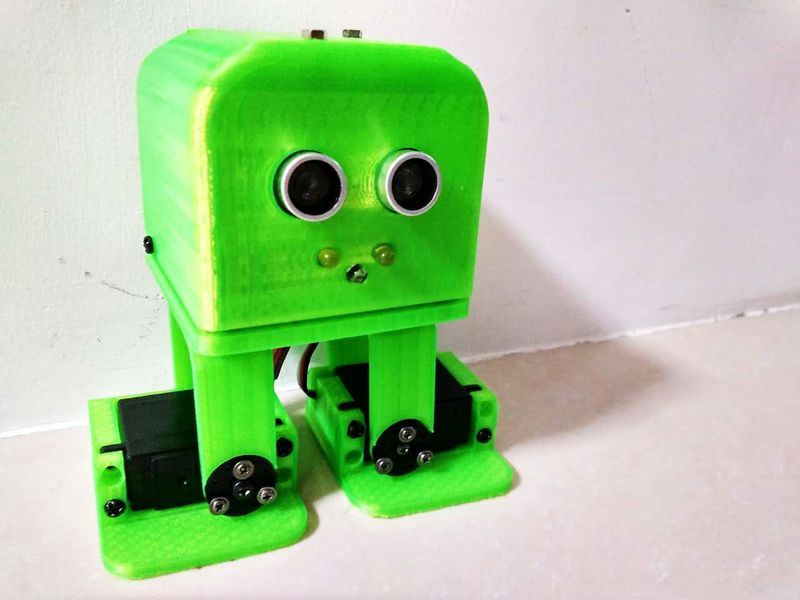
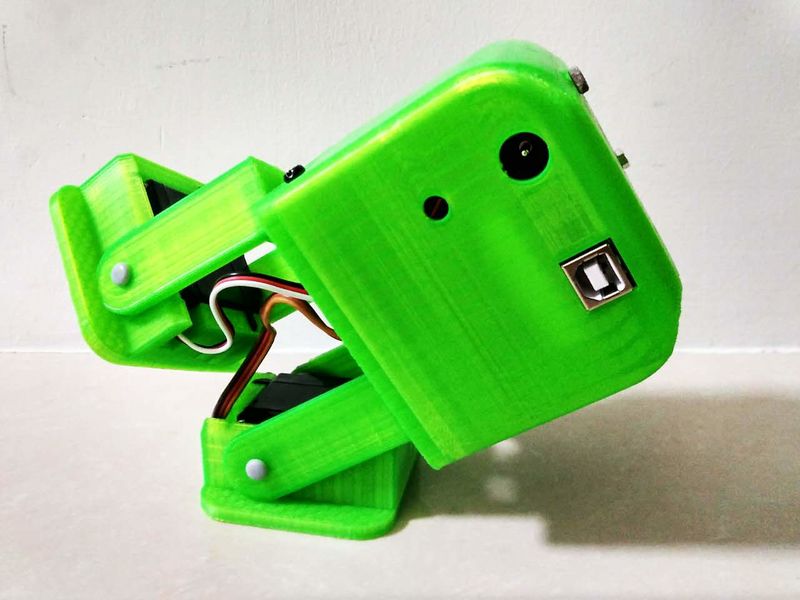
 Français
Français English
English Deutsch
Deutsch Español
Español Italiano
Italiano Português
Português